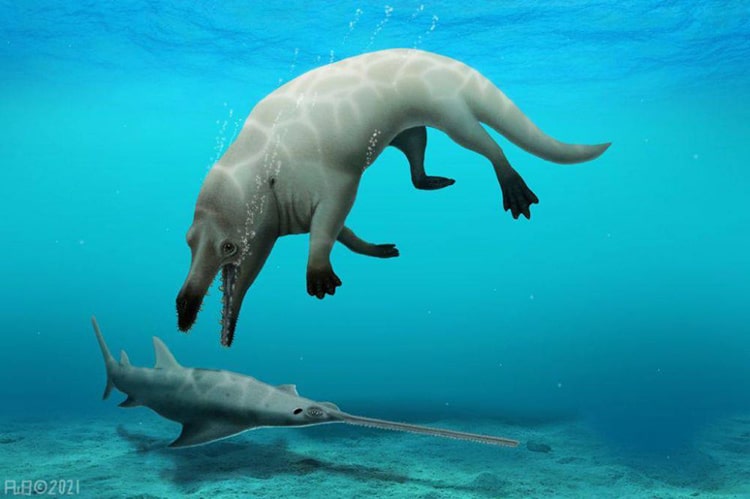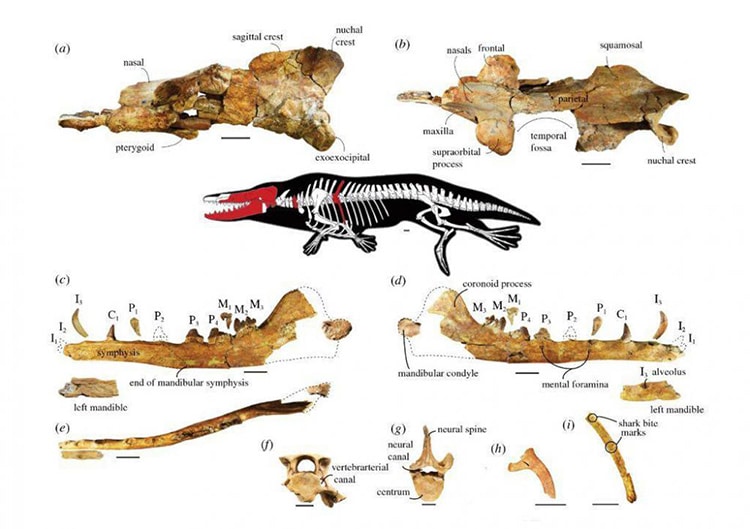
Photo: Robert W. Boessenecker
Whales today are aquatic—catching krill or leaping to capture unsuspecting seals, depending on the whale species. While some species like humpbacks are regarded as gentle giants, the prehistoric ancestors of modern whales were rather more frightening. A team of Egyptian paleontologists recently published their discovery of a 43-million-year-old fossilized whale with four legs and a powerful jaw.
The fossilized bones of the ancient whale were discovered in 2008 in the Fayum Depression in the Egyptian desert. The fossils date to the middle Eocene, a period from about 47.8 to 38 million years ago. The bones were from the skull, jaws, teeth, vertebrae, and ribs of the creature. From these, the scientists deduced the whale had four legs, a powerful long jaw, sharp teeth, and weighed about 1,300 pounds at 10 feet long. The discovery and its subsequent publication mark the first time an Arab paleontology team has discovered, described, and named an ancient whale species.
The team studied the creature at the lab of Dr. Hesham Sallam, founder of the Mansoura University Vertebrate Paleontology Center and an author of the study. The whale has become known as Phiomicetus anubis. Anubis is a reference to the ancient god of embalming and the afterlife who had a jackal head with jaws much like the fossil. Abdullah Gohar, lead author of the study, explained to Live Science, “I think it was the god of death for most animals that lived alongside it.”
With its fearsome jaw, the Anubis whale was quasi-amphibious. The most ancient whales were in fact land creatures in the region that is present-day Pakistan. They eventually evolved into swimming creatures with legs who could spend time on land or in water. They also developed from herbivores to the fearsome carnivore that is the Anubis whale. The creature likely fed upon fish, crocodiles, and the calves of other whale species. They were not, however, invulnerable. Some of the fossils show the marks of scavenging shark teeth.
The Anubis whale answers questions for many paleontologists who seek a clearer picture of how whales became the aquatic creatures of today. To read the full paper yourself, check out the Proceedings of the Royal Society B.
A team of Egyptian paleontologists has published their discovery of a four-legged, fearsome prehistoric whale.

Study authors Mohamed Sameh (left), Abdullah Gohar (center), and Hesham Sallam (right) with the holotype fossils of the new whale, Phiomicetus anubis, at Mansoura University Vertebrate Paleontology center. (Photo:Abdullah Gohar)
The whale is named after Anubis, the Egyptian god of embalming and traveling to the afterlife.

The Fayum Depression in Egypt, where the whale fossil was found. (Photo: Gohar A.S. et al (2021))
This fearsome creature is one step in the evolution of whales from land animals to beasts of the sea.

The Anubis whale's jaw. (Photo: Gohar A.S. et al (2021))
h/t: [Live Science, NPR, BBC]
Related Articles:
Amazing Fossil Find Shows a Non-Avian Dinosaur Sitting On Its Nest of Unhatched Eggs
Fossil Discovery Unlocks the Mystery of What Happened the Day the Dinosaurs Died
Interactive Map Reveals Which Dinosaurs Roamed Your Hometown Millions of Years Ago
World’s Oldest DNA Is Discovered in a 1.2-Million-Year-Old Mammoth






















































































